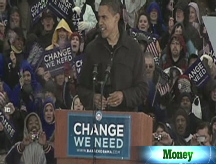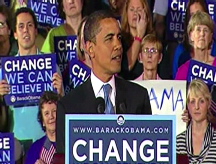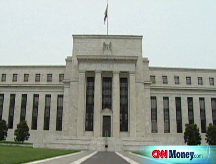Asia cheers Obama win, but Europe down
U.S. stock futures set for retreat after Democrat captures White House.
NEW YORK (CNNMoney.com) -- Major Asian markets ended lower Wednesday, but European stocks and U.S. futures fell after Democrat Barack Obama was projected to have been elected President of the United States.
In Asia, the Nikkei, the major index for the Tokyo Stock Exchange, closed up 4.5%. South Korea's Kospi composite index finished with a 2.4% advance, according to Dow Jones. The Hang Seng index in Hong Kong ended up 3.7%.
The Australian All Ordinaries index was up almost 3% at its close.
Markets in Taiwan and the Philippines ended lower.
"The international markets are certainly celebrating an Obama victory," said Jack Ablin, chief investment officer at Harris Private Bank in Chicago, of the Asian advance. "From the world perspective, Obama is perceived as a better candidate and I think they are voting with their dollars."
But European markets began Wednesday with significant declines. London's FT-100 and Paris' CAC-40 eeach fell more than 2%, while Germany's Dax was about 1.5% lower.
U.S. futures: At 3 a.m. ET, the Dow Jones, S&P and Nasdaq futures contracts - which give an indication of how stocks will trade when markets open in the morning - were lower.
One factor may have been the gains Democrats made in Congress, adding to their majorities in the House and Senate.
David Kelly, chief market strategist at JPMorgan Funds, said that "there are some concerns about what a Democratic sweep of the House, Senate and president would mean."
He added, "sometimes people say that divided government is better for the economy."
The futures decline followed a strong regular session rally. On Tuesday, the stock market surged, with the Dow jumping more than 300 points.
Another reason that the reaction in U.S. futures differed from Asian markets was because Wall Street had already jumped Tuesday.
"You saw the reaction during our trading session," said Rich Yamarone, chief economist at Argus Research. "The global market piggie-backed on what happened during our regular trading session," said Yamarone.
Another economist echoed the idea that the rally on Wall Street Tuesday gave a lift to global markets, in addition to optimism provided by Obama's victory. "There is some positive carryover in Australia and Asia from the rally the U.S. enjoyed on election day," said Hoffman.
Another analyst said the U.S. market reaction differed from other parts of the world because domestic investors had a better understanding of how much of a lead Obama had heading into election night.
"An Obama victory was pretty widely anticipated and part of that enthusiasm was reflected in today's market," Ablin said Tuesday night. "Whereas maybe overseas, those investors didn't fully appreciate the strength that Obama really had going into today's election," he added.
Sigh of relief: In the wake of unprecedented economic turmoil, Wall Street looked for an end to the uncertainty that has built up over the long campaign.
"The fact that we can get this contentious election behind us is cathartic by itself," said Ablin.
Throughout the election, the struggling economy has been the number one issue on voter's mind. In the past month, focus on the economy has intensified as the government has introduced a series of sweeping efforts to recapitalize the nation's banking system and revitalize lending.
According to exit polls on Tuesday, 62% of voters said the economy was the most important issue in the election. ![]()




